Oklahoma's lax marijuana laws made it a green utopia for the cannabis industry. Then came the mass murder.

Fourteen months after the murders, the garage of the abandoned marijuana farm on prairie tableland northwest of Oklahoma City sits frozen and dark.
Clothes hangers meant for drying weed dangle from metal poles stretched across the ceiling. Electric fans and plastic footstools are toppled over. The remnants of face-high marijuana plants lie flat on the unswept concrete.
Electrical outlets and two air-conditioning units are crudely cut into white plaster walls. Under one of those outlets is a sign of the horror that happened here: blood splatter dried to a reddish brown.
Situated in Kingfisher County, Oklahoma, the farm sits on a dirt path about two miles from the nearest paved road, surrounded by flatland. The closest town is Ames, Oklahoma, population 193, about 13 miles to the northwest.
On November 20, 2022, a man with a handgun executed four people on this farm, inside this garage.
On the night of the murders, responding officers found a whimpering dog standing beside one of the bodies.
Today, paw prints are still visible in the dust.
This inconspicuous rural farm may have seemed like an ideal place for its owners to go unnoticed.
And if a mass murder hadn't happened here, it may have worked.
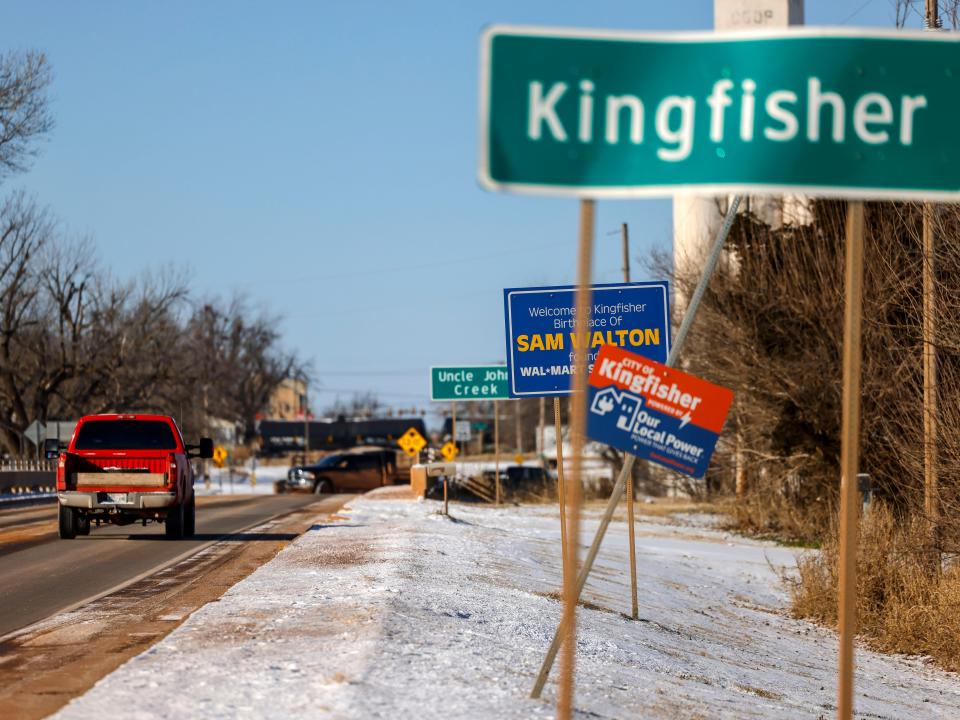
On June 26, 2018, Oklahoma voters approved, by about a 57 percent margin, the Oklahoma Medical Marijuana Legalization Initiative, becoming the 30th state in the country with legal cannabis in one form or another. But rules around how the state regulated it were remarkably spare, making it one of the most lenient states for growing and selling marijuana.
In Oklahoma, the application fee to start growing or selling medical pot is $2,500, and there is no statewide limit on the number of growers that can be licensed to sell to dispensaries. Compare that to Pennsylvania, where there's a cap of 25 marijuana growers or processors for the whole state, a nonrefundable $10,000 fee just to apply to grow marijuana, and a requirement that each licensed grow operation have access to $2 million in capital, including at least $500,000 in the bank. California has dozens of different designations for types of marijuana-growing licenses, which can cost as much as $77,905 a year. Arkansas, next door to Oklahoma, has a strict license cap and restrictions on residential cultivation, and requires license holders to prove they have $500,000 in liquid assets.
Pretty much every state has designed its own complicated set of barriers to start growing or selling marijuana, except Oklahoma. When Oklahoma legalized medical marijuana, the only real requirement was that Oklahoma residents had to be involved in marijuana growing and selling. Oklahoma, a boom-and-bust state since oil was first discovered there in 1859, exploded with marijuana operations. By October 2021, Oklahoma had more licensed cannabis farms than California, with a 10th of California's population. And marijuana proved a windfall for the state. According to data from the Oklahoma Medical Marijuana Authority — known as OMMA, the agency set up to write and regulate marijuana policy in Oklahoma — the state pulled in over $100 million in tax revenue from marijuana sales in 2020 alone.
But lax oversight of Oklahoma's legal marijuana market invited corruption and violence. Thousands flocked to the state seeking quick profits in cannabis, only to find fierce competition and rampant fraud. As criminal enterprises exploited the system's openness, law enforcement responded with heavy-handed crackdowns, gutting legitimate businesses as well.
While Oklahoma voters had welcomed in the marijuana industry, its law-enforcement community — and some of the state's law-and-order voters — saw red. And not just because of the threat of violence. Folks paying attention to property records started to see lots of business names connected to investors from around the world, particularly Chinese investors. The panic went national.
In July 2022, Oklahoma's Republican governor, Kevin Stitt, went on Sean Hannity's Fox News show to warn that Oklahoma was the state with the "No. 1 land purchases by the communists or foreign nationals" in 2020, which he described as "a red flag for anybody."
A month later, Dan Newhouse, a Republican Washington state representative, wrote an op-ed for Fox News warning of "Chinese nationals buying Oklahoma farmland at exorbitant prices, growing thousands of pounds of marijuana, and distributing it on the U.S. black market. Perhaps China considers this a bonus."
Then the quadruple murders happened. The name on the growing license for that farm in Kingfisher County was Liu and Chen Inc., and the property was owned by Yi Fei Lin, a Chinese national.
Afterward, people wondered why no one in law enforcement stopped a Chinese marijuana-growing operation where armed guards were known to hang out nearby before it turned into the site of a mass murder. Legalization was supposed to reduce the incentives for powerful cartels to sell marijuana on the black market. Instead, Oklahoma turned into a playground for marijuana growers — both criminal and not.
Many grow operations are connected to Chinese organized crime, said Mark Woodward, a spokesman for the Oklahoma Bureau of Narcotics and Dangerous Drugs, or OBN, the law-enforcement entity that polices the state's marijuana industry. "These farms are ultimately run by people who are tied to violent crime, human trafficking, labor trafficking, sex trafficking, homicides, extortion, money laundering — there's so many other criminal activities."
At its peak in 2021, OBN received applications for more than 9,400 growing operations. In 2022, the Oklahoma legislature set a moratorium on new licenses.

Adria Berry, the executive director of the Oklahoma Medical Marijuana Authority, is tempted to say, "I told you so."
"I'm personally not against the use of cannabis," she said. But the lack of any regulatory framework meant only one thing.
"It was obviously going to explode."
In 2020, Barb Miuccio, a 52-year-old entrepreneur then based in the northern suburbs of Dallas, was looking for business opportunities during the pandemic. She wanted a new business — one she could potentially pass on to her kids.
She partnered with Jeremy Grable, an experienced marijuana grower looking to capitalize on Oklahoma's lax laws. Originally from Dallas, Jeremy honed his marijuana-growing skills out West before returning home. Considering Oklahoma's approach to legal weed, Barb and Jeremy saw an opportunity.
But Barb soon discovered the dark side of the unchecked green rush: minimal oversight, shady players, and criminal practices. After years of thwarted harvests, broken partnerships, and the very real threat of prison time, she said she's burned through a substantial amount of her savings.

Barb, who is admittedly "not a weed person," saw in Jeremy someone with a green thumb who could handle the plants while she handled the business.
That meant taking the lead on licensing. But Oklahoma required 75% of any marijuana business to be owned by an Oklahoma resident. A quick Google search gave her options for plenty of lawyers offering to help would-be weed entrepreneurs.
She found Matt Stacy, an Oklahoma City-based lawyer, whose background seemed perfect for helping outsiders navigate his home state. A chummy 44-year-old white guy born and raised in Oklahoma, Stacy served for over 20 years in Oklahoma's Army National Guard, where he's a lieutenant colonel and decorated war hero after serving multiple tours in Afghanistan, Iraq, and Ukraine. He's a member of numerous legal associations and politically connected: Stitt appointed Stacy to lead the state's COVID-19 response team despite Stacy having no evident experience in health or science prior to the pandemic.
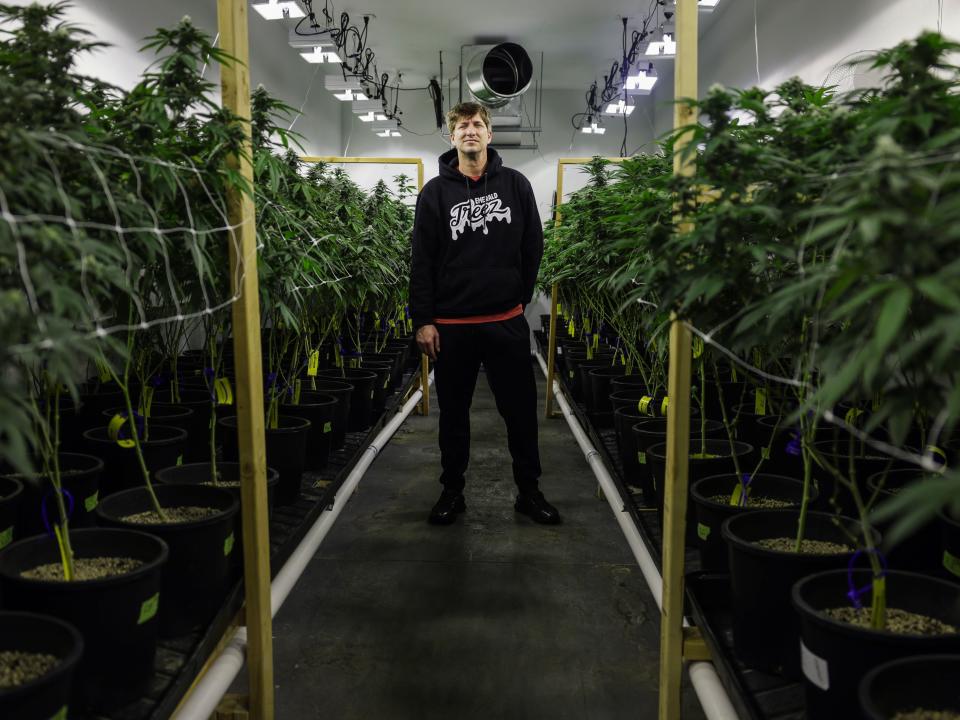
Barb said Stacy assured them he'd take care of the details, including finding an Oklahoma resident to claim a 75% stake in the business, and guaranteed Barb and Jeremy they'd get licensed.
Matt Stacy declined to be interviewed for this story.
By August 2020, Barb and Jeremy had Stacy on retainer and rented a beige, no-frills industrial building in Moore, about 10 miles south of Oklahoma City. Stacy told them that he'd filed their paperwork, and in September, inspectors from OMMA dropped by to evaluate their location.
"This all happened pretty quickly," Barb said.
Barb and Jeremy decided on a name — Emerald Treez — and OMMA issued them a license.
That's when things started to get strange.
In November 2020, according to Jeremy and Barb, Stacy called them out of the blue and said he was going to send over one of his other clients to buy marijuana plants.
That their politically connected, Republican war-hero lawyer was, as Barb and Jeremy tell it, acting as a middleman didn't initially strike them as odd. "We're like, 'Hey, this guy's got a network,'" Barb said.
Barb said Stacy seemed to have a lot of clients who had migrated from China to take advantage of Oklahoma's growing laws. Jeremy and Barb didn't care where they came from. "Money's money," Jeremy said.
Then, Barbara and Jeremy said, Stacy hooked them up with a "marijuana-friendly" local bank — a necessity since federally backed banks won't accept deposits for marijuana businesses.
But some of Stacy's advice about banking seemed off, like telling them not to open an account in their names or under the name Emerald Treez. "He told us, 'Go open your bank account in this name. Don't tell 'em it's marijuana,'" Barb said. When she questioned this, she said Stacy responded: "Oh, don't worry. I walk in there with gym bags full of half a million dollars and it's all good."
Despite the banking irregularities, they continued working with Stacy — he had, after all, fulfilled his promise to set up their license, and he continued to send them clients who wanted to buy plants. They assumed his connections in the state would protect them.
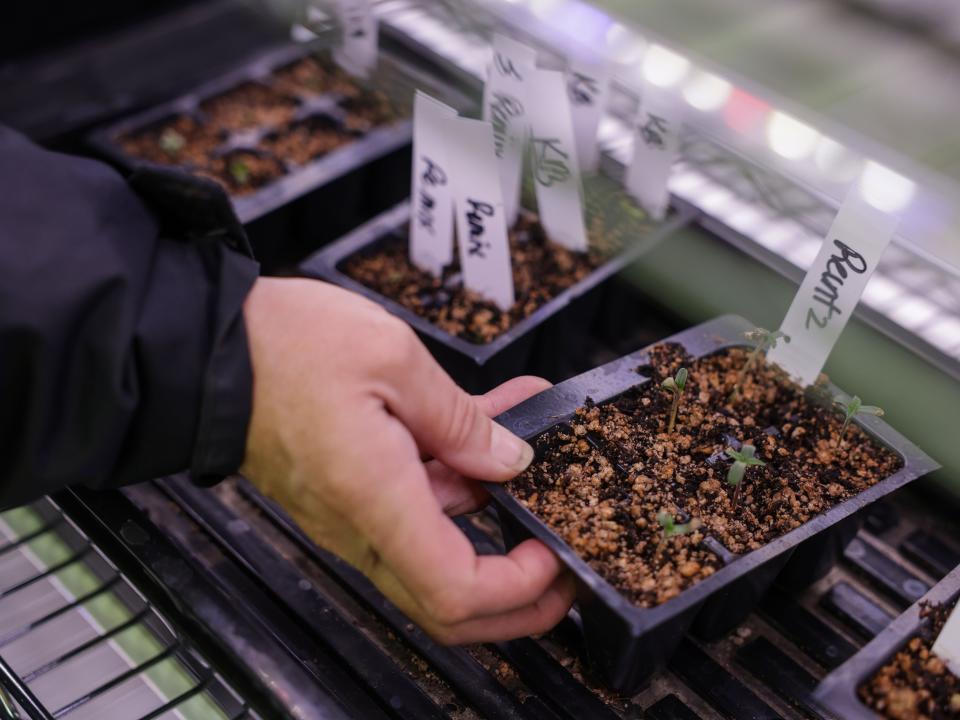
In December 2020, one of Stacy's clients visited Emerald Treez to buy plants but asked to see their OBN license first.
Barb said it was the first time she'd heard of the Oklahoma Bureau of Narcotics and Dangerous Drugs.
Marijuana licensing in Oklahoma was lax but it did require registering with OBN as well as OMMA, which neither Barb nor Jeremy knew about because, they said, Stacy hadn't told them.
Stacy blamed the mix-up on OBN, Barb said. He texted Barb a screenshot of what was supposedly Emerald Treez's OBN license number. The potential buyer wouldn't accept it because it wasn't an OBN application number — not even close.
Barb and Jeremy pushed ahead, not knowing the worst was still to come.
One day in May 2021, Jeremy and Barb left the grow facility to get supplies. According to Barb, the owner of a neighboring building called Jeremy and said, "OBN is at your building. Doors open on squad cars, guns drawn." Their neighbor, Barb said, walked over and the agents told him to mind his business. Barb and Jeremy decided to stay away.
Ultimately, OBN didn't raid Barb and Jeremy's business then, but they called Matt Stacy and said Stacy marked it up to confusion — OBN probably had the wrong place.
They assumed their lawyer was right and went back to work.
On June 30, 2021 — nearly a year after they started the process to grow in Oklahoma — Barb and Jeremy received an email from Stacy.
"It's like, 'Your grow is not gonna get approved for a license, and if you have any product in your building, I suggest you get rid of it now,'" Barb said.
They tried to call Stacy but he didn't pick up. They got in the car and drove to Stacy's office, but it was locked up tight with no one inside; it looked to be closed.
Barb and Jeremy were dumbfounded.
"We were losing it," Barb said.
The same chaotic, unregulated gold rush that sucked in Barb and Jeremy left four dead in Kingfisher County.
The garage where three men and one woman — all of them Chinese nationals — were killed in November 2022 was unlocked on the January morning when Business Insider visited this year. The saltbox-roofed building was a refuge from zero-degree temperatures and cutting wind.
A heavy, gray metal fence slid open on creaking casters. A dirt path led to the building where the killings occurred — the garage with the hangers and the blood splatter.

A large mobile-home trailer sat just behind the garage. Inside the trailer, a sign on the door was written in Chinese: "Please shut the door behind you." Clothes were strewn everywhere. In the main room, two refrigerators sat empty, save for some decaying condiment bottles. Dry weed shake lay intermingled with dust on the floor. A hallway adjacent to the main room led to at least six bedrooms with mattresses and Chinese soda and beer cans and cigarette butts on the floor and more shoes and clothing tossed everywhere. In another section of the mobile home, the kitchen was a dusty jumble of pots and pans toppled over in haphazard piles to the floor.

Jonathan Riedlinger, one of the Kingfisher County sheriff's deputies who arrived at the scene after the murders, said the farm itself was mostly empty.
"Everything was overgrown," Riedlinger said. "There wasn't a whole lot there. There was one barn that had two rooms that had an active marijuana grow."
Around dusk on November 20, 2022, Riedlinger's office received an emergency call from Yi Fei Lin, according to charging documents filed by the Oklahoma State Bureau of Investigation. Despite a language barrier, Lin attempted to describe a hostage situation at 2372 N. 2760 Road, in Hennessey, Oklahoma.
Sheriff's deputies arrived and found Lin in a black Ford F-150. He had been shot multiple times and was severely wounded. Deputies cautiously approached the two-car garage, where they found three men and a woman — later identified as Qirong Lin, Hechun Chen, He Qiang Chen, and Fang Lee — dead on the garage floor.
Deputies found two other people alive on the farm. One survivor, Wenbo Lin, told investigators through a translator that he had been working on the farm for 10 days. On the night of the murders, Wenbo Lin told investigators that he was working in the garage when a man named Wu Chen — whom Wenbo Lin didn't know, but another witness told investigators Chen had worked on the farm a year earlier — arrived unannounced. Witnesses told investigators that once inside the garage, Chen shot one man, identified as "The Boss," in the leg and then shot a dog. Chen then held the four others at gunpoint.
Chen demanded $300,000, according to the charging documents, and he threatened to kill everyone in the room if he didn't get it. Over the next half hour, workers at the farm made phone calls, desperately trying to pull together the money. While they waited, two of the men in the garage attempted to rush Chen. Chen shot and killed one of the men, and then shot Yi Fei Lin as he attempted to flee the garage. Lin was able to hide and told investigators that he heard multiple shots from inside the garage.

In the aftermath, the shot dog whimpered beside its dead owner. "She wasn't aggressive," Riedlinger said of the dog. "I mean, she was pretty docile for being shot. You would've thought that she'd be a little more mad." A vet came and checked the dog out, but Reidlinger didn't know what happened to the dog after that.
The Kingfisher murders were a turning point in Oklahoma's marijuana crackdown. "It woke the public up, it scared the public because they're all over Oklahoma — these farms are," Mark Woodward, from the OBN, said. "I think people started saying, 'That could happen across the road from me and my family.'"
Jed Green, a pro-marijuana activist in Oklahoma, said the murders "reinforced the narrative that the majority — or at least a lot — of the grow operations here are or have been operated by cartels."
"It's one thing to bust some folks and say, 'Hey, this was a cartel deal,'" Green said. "But when you have a quadruple homicide, it really drives home the narrative point of the shady criminal side of a number of these past operations."

On October 17, 2022, Oklahoma prosecutors filed 34 felony charges against Matthew Alan Stacy, including five counts of illegally manufacturing thousands of pounds of marijuana — charges that, if he were convicted, could put Stacy in prison for the rest of his life and then some. Barb and Jeremy are listed as witnesses in the charging documents. Stacy pleaded not guilty to the charges.
The state of Oklahoma isn't claiming that Stacy grew pot illegally in some back room of his law office. It alleges that he led at least six aspiring growers — including Jeremy and Barb — to believe that they had submitted all the necessary paperwork to be licensed to grow pot under Oklahoma's new rules when, in fact, they hadn't. Prosecutors say that since Stacy led the growers to believe they could legally manufacture a controlled substance — literally thousands of pounds of marijuana — he's ultimately responsible for it.
Stacy also set up a network of "straw owners," prosecutors say, helping out-of-state growers skirt the requirement that 75% of a cannabis business be owned by Oklahoma residents. He was listed as the registered agent for at least 214 different LLCs licensed to grow or sell marijuana through OMMA. He'd put his own name on these license applications, prosecutors say, and then used names of other Oklahoma residents to ensure that each application technically met threshold requirements.
Straw owners would claim to own 75% of a business while knowing almost nothing about it. "These people said, 'All I know about the business is that I go to the mailbox once a month, and I get a check to say that I'm the owner,'" Woodward said. "They committed fraud."
During Stacy's preliminary hearing in May 2023, a woman named Helen Carillo, the Oklahoma resident listed on Barb and Jeremey's application, testified that Stacy had paid her $5,000 apiece to be a silent owner for three marijuana licenses — and then placed her name on dozens of others without informing her. Her objection was not that Stacy placed her name on dozens of licenses but that she didn't get paid for all of them.
Barb and Jeremy are also suing Stacy in civil court. The case is pending, and Stacy has filed a motion to dismiss the allegations.
"He's personally responsible for ruining our business," Jeremy said.
None of the state charges against Stacy indicate a connection to violent crimes.
The abandoned marijuana farm in Kingfisher County was also licensed with a straw owner. The person who arranged that license — Kevin Pham, the founder and CEO of CSI Accounting Services in Oklahoma City — is charged with many of the same crimes Stacy faces, including defrauding the state by providing false information to obtain marijuana licenses. (Pham also faces methamphetamine trafficking and firearms charges.)

Pham has pleaded not guilty in the ongoing case. He declined to speak to Business Insider for this story.
Oklahoma's primary illegal-drug law-enforcement entity has shut down thousands of marijuana-growing operations, arrested more than 250 people connected with those grows, and confiscated nearly 1 million pounds of illegally grown marijuana, according to internal OBN data.
"These are grows that are tied to homicide, that are tied to sex trafficking and labor trafficking and environmental messes, gambling operations," Woodward said. "You're talking about nearly 11,000 businesses that were operating in Oklahoma." OBN's job, he said, is to figure out who was doing it legally versus illegally.
A 2022 report from Whitney Economics, a group that studies the cannabis industry, found that as much as 75 percent of marijuana production in the US is done for unlawful sales. An investigation by ProPublica and The Frontier uncovered evidence of Chinese organized crime groups engaging in human trafficking to support illicit marijuana operations. NBC spoke to Chinese workers at illegal grows in California who said they were recruited for their jobs through Mandarin-language websites, and a Searchlight New Mexico investigation found that Mandarin-language ads run on the social-media app WeChat offered to bring Chinese nationals Stateside to work on illegal farms.
Woodward said Oklahoma is ground zero for these workers and illegal marijuana production generally. Court filings in Oklahoma seem to back up that belief.
In February 2023, local law enforcement arrested a Chinese national and accused him of transporting more than 2,700 pounds of marijuana in a fake Amazon delivery truck to an Oklahoma City grow operation for illegal distribution. Another raid led to charges against owners of a Chinese restaurant, who prosecutors say concocted a scheme to launder $25 million in illegal marijuana proceeds. In January, local police raided an Airbnb in Edmond, just north of Oklahoma City, and arrested nine Chinese nationals, who are facing charges related to distributing marijuana out of state. And human trafficking is a constant concern: In October, investigators arrested a suspect on human-trafficking charges, alleging he was involved in an Oklahoma City brothel where many clients appeared to be managers and administrators of Chinese-owned marijuana grows.
Woodward said one of OBN's goals is to help legitimate growers: "The industry just has not had a chance to even really get off the ground because the criminals immediately came in and undercut prices and workers and labor costs and everything."
But Oklahoma's marijuana crackdown has sparked accusations — perhaps not surprisingly, given the xenophobic overtones — of overreach.
A Vietnamese Hmong grower near Tulsa told Business Insider that he and other Hmong growers are targeted by OBN and local law enforcement as though they're on orders from China to grow marijuana and ship it illegally to other states. They "see all Asians as Chinese," he said. The grower, a former schoolteacher, declined to be identified, fearing recriminations for speaking out.
OBN denied it targeted Asian growers. "OBN has identified and shut down illegal grows, as well as made arrests on illegal farms tied to organized crime from China, Mexico, Russia, Bulgaria, Armenia, and the Italian mob over the last three years, as well as numerous American-owned and operated operations," said Woodward.
Green, the legal-weed advocate who heads up Oklahomans for Responsible Cannabis Action, described the rocky start in Oklahoma's legalization efforts as growing pains. He talked about the historical booms and busts of Oklahoma industries like oil, shale gas, and wheat, which contributed to one of the most significant environmental disasters — the Dust Bowl — in American history. Oklahoma's aggressive law-enforcement efforts to eliminate marijuana grows are typical for the state. "You get a rush of enthusiasm, then a clampdown," Green said.
Green sees Oklahoma's marijuana troubles as a hiccup in the gradual movement toward federal legalization. "That's our goal," he said.
Indeed, it's difficult to imagine Oklahoma's half-decade weed rollout being as chaotic as it has been if Congress passed federal legislation making marijuana legal and regulating it like alcohol — with federal rules around production but allowing each state to make its own rules around sale and consumption.
Barb and Jeremy have an interest in seeing marijuana legalized at the federal level, too.
It's been a rough few years for them. They were forced to destroy a crop because of OBN licensing issues, and then their grow operation caught fire, apparently because of faulty electrical work, killing a harvest. They tried to open a dispensary to sell their product, but the deal they were working on went sour. They hope to sell through other dispensaries when their current harvest is ready for sale, but so far Emerald Treez is deep in the red. Barb's hope is that if marijuana does become legal on a federal level, they can expand their business out of Oklahoma.
Until then, they're stuck here.
After a steak dinner at Cattlemen's Steakhouse in Oklahoma City in February, Barb considered whether she would have done things differently.
"Yeah, I'll tell you what I wish I did differently," she said, taking a drag off a Virginia Slim. "I wish I'd never fucking stepped foot in Oklahoma."
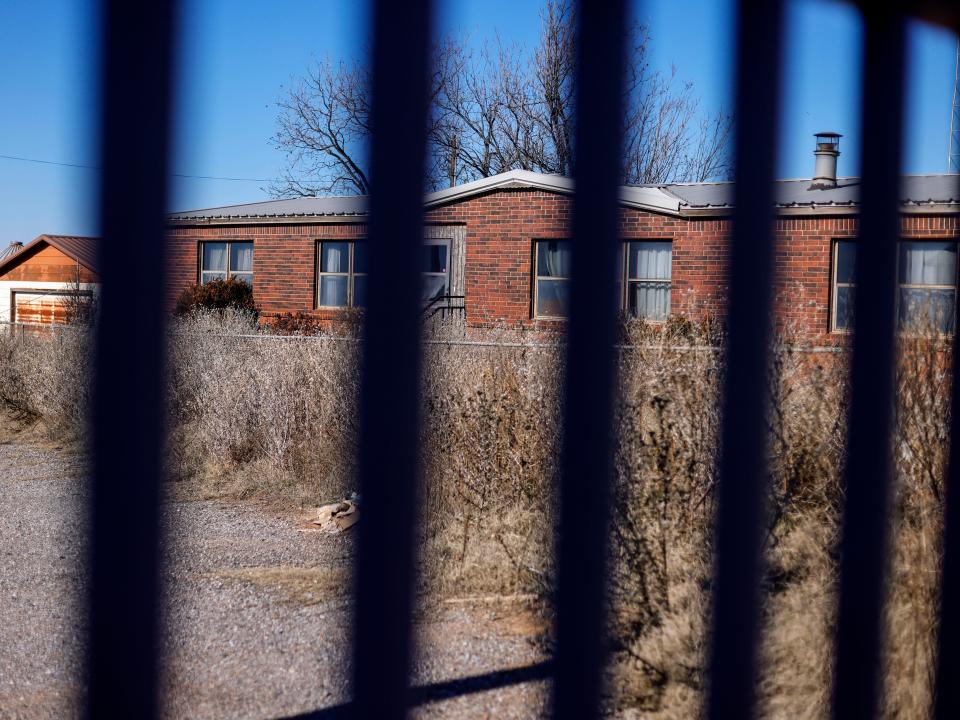
After the murders, Wu Chen fled the scene, but he dropped his phone. Investigators were able to analyze it and determined he was headed to Florida. Police in Miami Beach found him two days later, on November 22, 2022, and arrested him without incident.
Ken Thompson, a Kingfisher County Sheriff's Office lieutenant deputy, traveled to Miami with another deputy to drive Chen back. Thompson said Chen didn't speak a word of English. "It's not like he could tell me anything about his concerns," Thompson said. "But I gathered he feared for his life."
Investigators said Chen told them through translators that he'd invested $300,000 in the farm and came to get it back. The farm's owner was unable to come up with the money to pay Chen. At some point, he opened fire.
There are rumors around the Kingfisher County courthouse that the killings may have been in retaliation for another shooting. Court records showed Yi Fei Lin and one of the murder victims, He Qiang Chen, were awaiting trial on charges related to a shooting in 2020, in uptown Oklahoma City, after a dispute over money. Lin and the now-deceased He Qiang Chen pleaded not guilty to those charges.
A preliminary hearing for Wu Chen had been scheduled for early February, and Yi Fei Lin and others were set to testify about what happened. But prosecutors offered Chen a deal: life in prison with no death penalty. He took it, ending the case. He'll spend the rest of his life in an Oklahoma prison.
In addition to the uptown Oklahoma City shooting, prosecutors have charged Yi Fei Lin with manufacturing at least 1,000 pounds of marijuana illegally — a charge that could land him in prison for more than 20 years. He's also accused of having used a straw owner to set up the business and has been charged with conspiracy against the state of Oklahoma. Lin has pleaded not guilty to the charges.
Murders like the ones in Kingfisher happen "more frequently than people realize," said Woodward. "Rule No. 1 is you don't leave a witness. He left a witness." If there are no witnesses, said Woodward, "you bury the bodies in the tree line, you bring another working crew in, and you pick up where they left off — and with a group that will bring you the money that they're supposed to be bringing in. These people are expendable and undocumented — nobody's missing these workers."
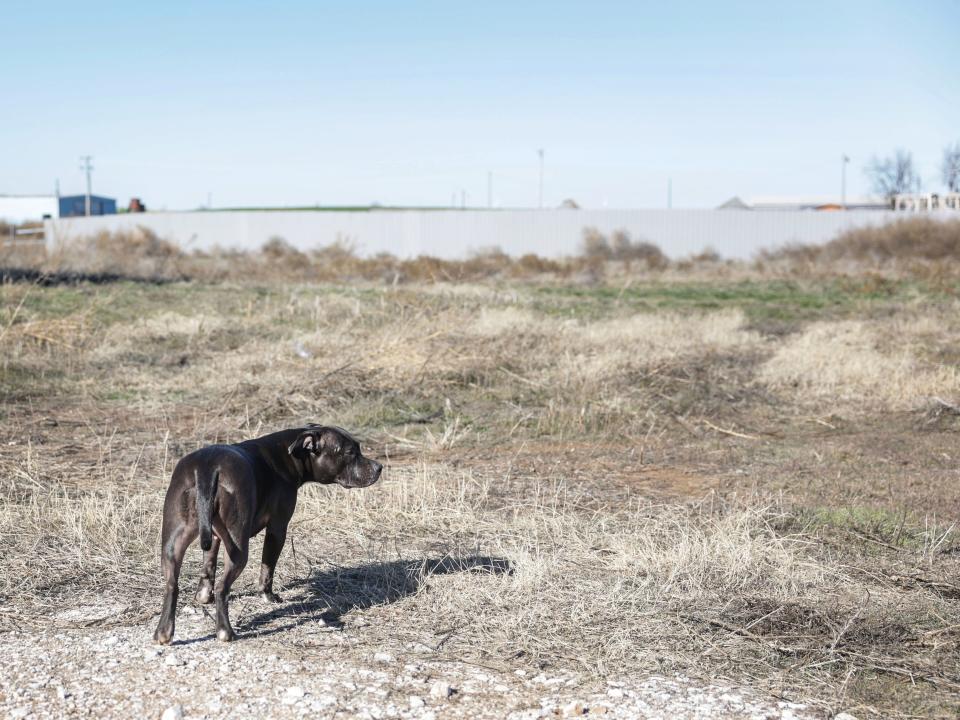
A half-mile south of the farm, next to a corrugated-steel building on land unaffiliated with Liu and Chen Inc., a man with an electrician's truck was pulling a big wire spool out of the enclosed bed of his pickup. He said the owner was inside the building.
A man with long brown hair, who declined to identify himself to Business Insider, emerged from the building. He had a dog with him — a black-and-gray pit bull he called Kiki.
He said that after the murders happened, the pit bull showed up and he took her in.
"I don't care if she's Chinese or not," the man said, as the dog sniffed a reporter's boots. "This is the best dog I've ever had."
Read the original article on Business Insider

